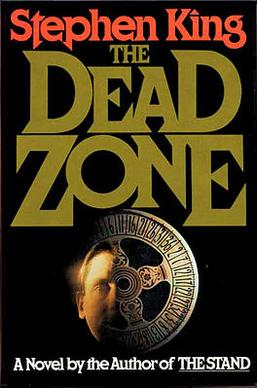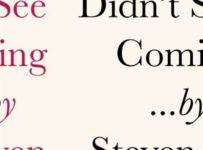
Stephen King's fifth novel was published eleven months after The Stand, which towered even in its original abridged form. The Dead Zone is a mere half the length, but it takes longer to get somewhere. Some King novels you're under the spell of at the time, and others you receive in retrospect. The Dead Zone is a novel that exists on the periphery — in its own Dead Zone — and defies expectations. It runs with some themes that are already recurring in King's work, and introduces the embryos of ideas that will bear such fruit as one could scarcely imagine.
Johnny Smith has had second sight since childhood. After a car accident leaves him in a coma for four and a half years, most of what Johnny liked about his life has changed or gone, and now touching someone can give him visions of their past, their future, or of horrors yet to come.
The Dead Zone is a remarkably episodic King work, with what one may have expected, at least by reputation, to be the driving narrative of the piece appearing only intermittently. If you've heard anything about The Dead Zone, it's probably that it features a dangerously charismatic politician who must be stopped before he can bring about the end of the world.An America in thrall to a vainglorious populist who says disarmingly outlandish things that no one takes seriously, except, in fact, enough people believe in him to make a difference? This sounds familiar. It's not lazy to say that the world we Constant Readers live in is one in which Johnny Smith never got a chance to change the future, because our Greg Stillson did win, and he's doing his damage as we speak.
The thing is that Stillson, rather than being a constant presence for Johnny to push back against, is only intermittently featured in the novel. Without a through line, Johnny is a free-floating psychic, almost a Bruce Banner figure who doesn't quite fit in anywhere. He makes a side trip to Castle Rock, the first appearance of that iconic location in King's repertoire. The town has yet to gain its reputation as a place where bad things happen, but The Dead Zone gives it the initial taste of death. It's a segment that could sustain a novel, if it wasn't such a flying visit.
All of this is to say that The Dead Zone spends a long time building itself up to a final reckoning, and what we have is some fancy footwork indeed. Johnny's destiny is met in that uniquely satisfying way that King has about his conclusions, and it is here that much of The Dead Zone pays for itself. It could not have ended any other way, but it would have been nice if it had not taken quite so many detours. This is a novel with a sterling introduction and conclusion, and fair to middling antics stuffed in between.
The strengths of The Dead Zone lie not in the relationship between Johnny and his sweetheart Sarah — who either has a larger role than she warrants, or too small of one to make an impact — but between Johnny and his father Herb. King returns once more to the well of overbearing mothers with fanatical devotions to religion, but Vera is tempered by the solidity of her husband, who turns out to be the one constant in his son's life. If Johnny treads water for several hundred pages of The Dead Zone, at least he has the tiniest support network for it. Longterm King fans will also be tickled by the knowledge that Jerusalem's Lot is an established place in the Maine of this novel, and that Carrie is a famous novel and film; if there's a novel in the continuum where the events of Carrie are canon, it had not happened at this point in publication.
The Dead Zone is a book that will work better for readers not desperately searching for a narrative thread, but it's a long climb for those looking for the sinew connecting it. This is a curiously unfocused effort for King, albeit from an era of his career where he could do no wrong; it is one of his rare novels where the conventional wisdom goes that the film adaptation is better. The Dead Zone is a novel with multiple elements recommending it, but its meandering structure holds it back from excellence.



No Responses